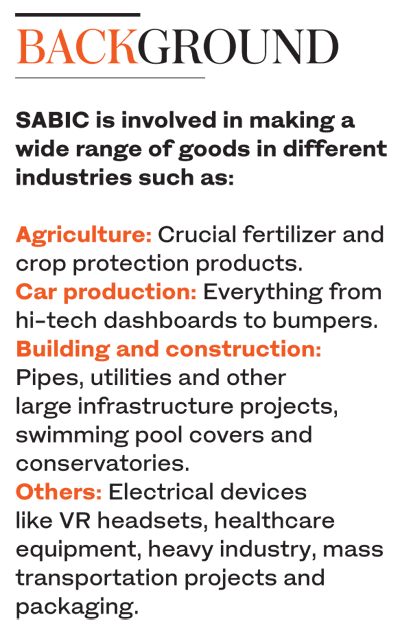DUBAI: When Mohammed bin Salman, Crown Prince of Saudi Arabia, recently reaffirmed in an interview with Bloomberg the commitment to sell shares in Saudi ARAMCO by 2021, he made it clear that part of the reason for the longer time frame was the need to protect and enhance SABIC, the Kingdom’s premier industrial conglomerate.
The prospect of ARAMCO and SABIC competing in downstream petrochemicals was not an attractive one for Saudi policymakers, so a strategic decision was taken to merge the two companies some time next year.
That deal will have the added benefit of freeing up around $70 billion for the Public Investment Fund, SABIC’s main shareholder, to further PIF’s aim of becoming the biggest sovereign wealth fund in the world. That underlines the central role that SABIC, as much as ARAMCO, has played in Saudi’s industry and economy for more than four decades.
The Royal Commission for Jubail and Yanbu may not be quite as catchy a title as Vision 2030, but in 1975, when the commission was set up, it was in many ways a precursor to the current masterplan plan to transform the Kingdom’s economy away from oil dependency.
The main result of the commission — which still exists as an agency in Riyadh — was the establishment of the Saudi Basic Industries Corporation, now known as SABIC and as one of the giants of the global chemicals industry. As much as any other Saudi corporation, SABIC is still playing its part in the national transformation strategy.
“It has been one of the major Saudi industrial success stories. SABIC has consistently performed well and contributed significantly to Saudi Arabia’s economy,” said Ellen Wald, president at Transversal Consulting, author of “Saudi, Inc.”
In 1975, as in 2018, the challenge was to diversify the oil-dominated economy, and the Kingdom had two specific industrial issues.
The first was the high level of flaring as a by-product of oil and gas production. Contemporary accounts describe a near-permanent pall of smoke over the Eastern Province from the burning off of materials not deemed essential for the fuel industry in those days.
The second was the sheer size of the Kingdom and the difficulties of linking up its industrial hubs. 
In the Eastern Province, the Saudi ARAMCO oil fields around Dammam had created their own industrial complex, producing and exporting crude via the Arabian Gulf. In the west, the port of Jeddah was the traditional hub for commerce along the Red Sea coast, but was over 1,500 kilometers away from the industrial powerhouse on the other side.
The commission that set up SABIC wanted to kill two birds with one stone: To use the by-products of oil and gas production, and to bridge the Kingdom’s industrial gap between east and west. The result was a 1,000-kilometer pipeline across the desert that transformed the two small ports at either end, Jubail and Yanbu, into industrial hubs.
The two cities are now SABIC’s main operational areas in the Kingdom. Jubail in particular is one of the largest industrial complexes in the world, while Yanbu is also booming as a second gateway to the Red Sea north of Jeddah.
Although SABIC is now the third largest chemicals company in the world with 34,000 employees across 50 countries, its corporate heart is in Saudi Arabia.
There are more operational sites in the Kingdom than anywhere else that SABIC operates. Some 24 manufacturing facilities exist in Saudi Arabia, with three more in Bahrain, compared to 15 in the Americas. Twelve in Europe and 10 in Asia round off the global footprint.
Although the initial intention may have been to find some use for the by-products of the fuel oil industry, now SABIC is committed to the principle of “chemistry that matters,” by making products that are used in every aspect of the economic life of the Kingdom.
In agriculture, it makes fertilizers and crop protection products; in the car industry, it makes products and materials that are used in every stage of production, from hi-tech dashboards to car bumpers.
In building and construction, SABIC is involved in pipes, utilities and other large infrastructure projects, but also makes swimming pool covers and conservatories. Electrical devices like VR headsets, healthcare equipment, heavy industry, mass transportation projects and packaging materials — that is the kind of range it covers.
In the early years, the bulk of these products were consumed by the growing Saudi Arabian industrial base, as the country’s economy began to boom after the oil price rose dramatically.
But the company, which issued its first public shares on the Saudi stock exchange in 1984 and became the largest quoted company in the region, also started to look abroad for export markets for its products.
The first SABIC exports left the country in 1983, and by 2000 it was selling in 100 countries around the world. Foreign industrial leaders began to realize there was more to Saudi Arabia than just the sale of crude oil and gas.
Three big deals in the early 2000s put SABIC squarely on the world industrial map. In 2002 it spent nearly $2bn on buying the petrochemicals business of Dutch group DSM; four years later it paid $700 million to Huntsman of the UK for its chemicals and polymers business; and in 2009 came the biggest to date — the $11.6bn purchase of the plastics division of American industrial giant General Electric. The foreign expansion continued recently with the purchase of a strategic shareholding in Swiss speciality chemicals company Clariant.
Richard Ulrych, vice president of the American industrial think tank Science History Consultants, said: “According to a recent ranking of chemical companies, SABIC ranks fourth in terms of sales. Only Germany’s BASF, China’s Sinopec and USA’s Dow Chemical are ranked above it in this respect.” 
The Clariant deal marks a significant expansion into the fast-growing field of speciality chemicals, seen by the experts as a high growth area for the future.
In common with many global industrial companies, SABIC has been increasingly aware of issues of sustainability and the environment, and now places these high up on the list of its corporate and social responsibilities (CSR).
What SABIC describes as the “circular economy” within the company reuses operational wastes in the largest facility of its kind in the world to capture and purify water used in the industrial processes, while also using renewable chemical feedstocks that minimize fossil fuel depletion.
In human capital development, SABIC has launched the Leadership Way program to build executive skill within the organization, and runs more than 6,000 courses to enhance employee skills. Some $57.5m was spent on initiatives in CSR in 2017. One future aim is to increase the level of female participation in the SABIC workforce, which stands at 7.2 percent.
SABIC has come a long way from the days of gas flaring and the Jubail-Yanbu pipeline. Anthony Harris, a former British diplomat in Saudi Arabia turned Gulf businessman, said: “SABIC has been one of the great success stories of the region. Now it is a global player and overall production has grown hugely since its inception.
“Like its elder brother ARAMCO, SABIC draws on a wide range of international talent to keep it in the forefront of technical excellence, particularly in the production of new chemicals,” Harris added. “It has enshrined sustainability in its business plan. It is a model in the region for using its industrial strategy to develop employment opportunities for young Saudis in a constantly expanding field.”



















